How can I help you?
Getting Started with WinUI Color Picker
16 Oct 202313 minutes to read
This section describes how to create a WinUI Color Picker control in a WinUI application and overview of its basic functionalities.
Structure of Color Picker control
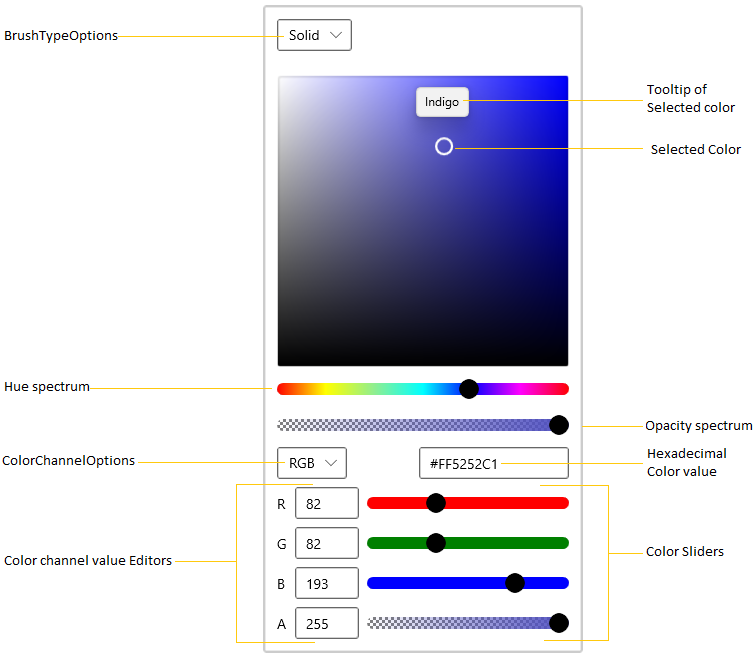
Creating an application with WinUI Color Picker
- Create a WinUI 3 desktop app for C# and .NET 5.
- Add reference to Syncfusion.Editors.WinUI NuGet.
- Import the control namespace
Syncfusion.UI.Xaml.Editorsin XAML or C# code. -
Initialize the
SfColorPickercontrol.<Page x:Class="GettingStarted.MainPage" xmlns="http://schemas.microsoft.com/winfx/2006/xaml/presentation" xmlns:x="http://schemas.microsoft.com/winfx/2006/xaml" xmlns:local="using:GettingStarted" xmlns:d="http://schemas.microsoft.com/expression/blend/2008" xmlns:mc="http://schemas.openxmlformats.org/markup-compatibility/2006" xmlns:editors="using:Syncfusion.UI.Xaml.Editors" mc:Ignorable="d" Background="{ThemeResource ApplicationPageBackgroundThemeBrush}"> <Grid Name="grid"> <!--Adding Color Picker control --> <editors:SfColorPicker Name="colorPicker"/> </Grid> </Page>using Syncfusion.UI.Xaml.Editors; namespace GettingStarted { /// <summary> /// An empty page that can be used on its own or navigated to within a Frame. /// </summary> public sealed partial class MainPage : Page { public MainPage() { this.InitializeComponent(); // Creating an instance of the Color Picker control SfColorPicker colorPicker = new SfColorPicker(); // Setting height and width to ColorPicker control colorPicker.Height = 300; colorPicker.Width = 300; grid.Children.Add(colorPicker); } } }
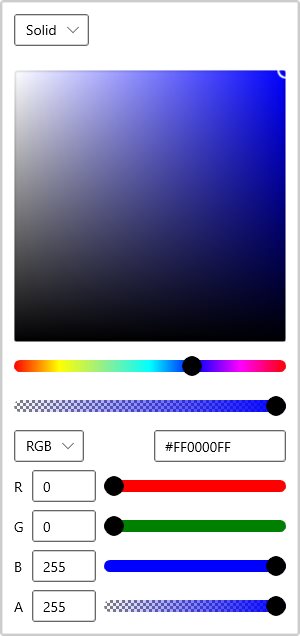
NOTE
Download demo application from GitHub
Select solid brush
You can select the solid color brush programmatically by setting the solid color brush value to the SelectedBrush property. You can select any solid color brush at runtime by clicking on the respective solid color brush area. You can also choose various solid color brush from different standard color models such as RGB, HSV, HSL, CMYK formats. The default value of SelectedBrush property is Blue.
<editors:SfColorPicker x:Name="colorPicker"
SelectedBrush="Yellow"/>SfColorPicker colorPicker = new SfColorPicker();
colorPicker.SelectedBrush = new SolidColorBrush(Colors.Yellow);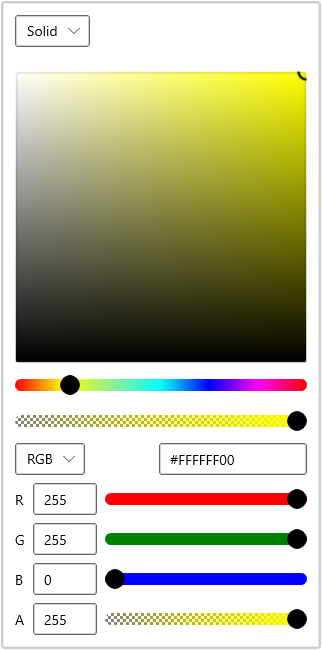
NOTE
Download demo application from GitHub
Switch between solid brush channels
You can select the color model by setting the required color brush model to the ColorChannelOptions property or select it from the drop down options. The default value of ColorChannelOptions property is RGB.
<editors:SfColorPicker x:Name="colorPicker"
ColorChannelOptions="HSV"/>SfColorPicker colorPicker = new SfColorPicker();
colorPicker.ColorChannelOptions = ColorChannelOptions.HSV;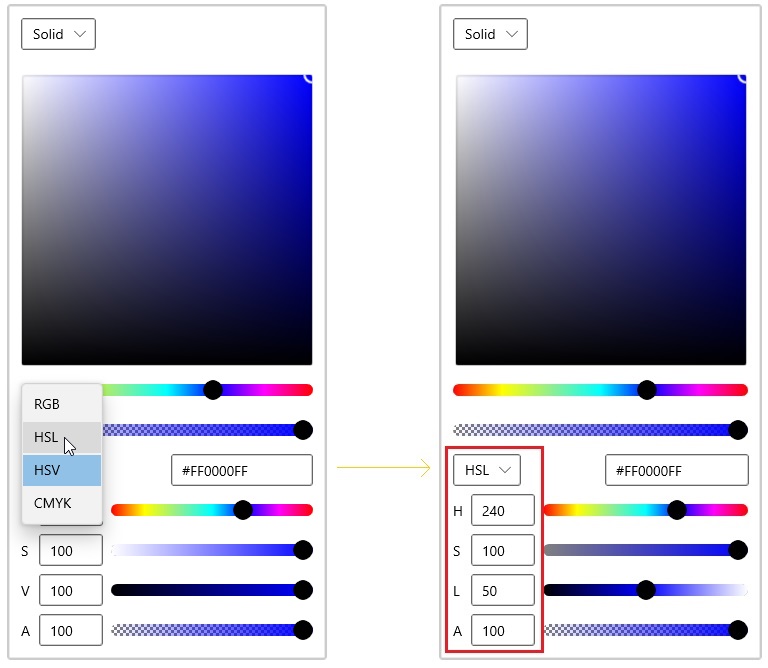
NOTE
Download demo application from GitHub
Change opacity of solid brush
You can change opacity of the selected solid color brush by using the A-Alpha value editor or delicate slider in the Color Picker. You can hide the A-Alpha slider by using the AlphaInputOptions property value as TextInput. The default value of the AlphaInputOptions property is All.
<editors:SfColorPicker AlphaInputOptions="TextInput"
Name="colorPicker">colorPicker.AlphaInputOptions = ColorInputOptions.TextInput;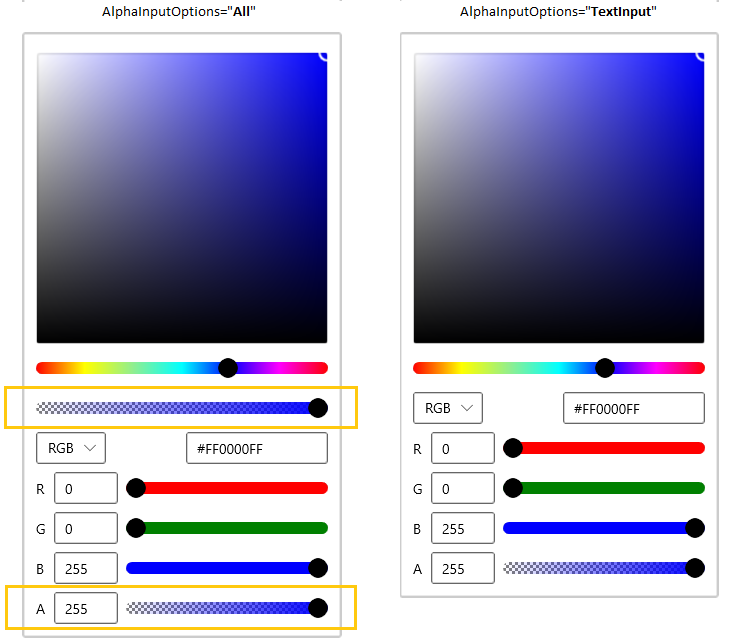
NOTE
Download demo application from GitHub
Hexadecimal editor
You can select a solid color brush by entering the hexadecimal color value to the hexadecimal value editor. You can also get the selected color hexadecimal value by using the hexadecimal value editor. You can hide the hexadecimal value editor by setting the IsHexInputVisible property value as false. The default value of IsHexInputVisible property is true.
<editors:SfColorPicker IsHexInputVisible="False"
Name="colorPicker">colorPicker.IsHexInputVisible = false;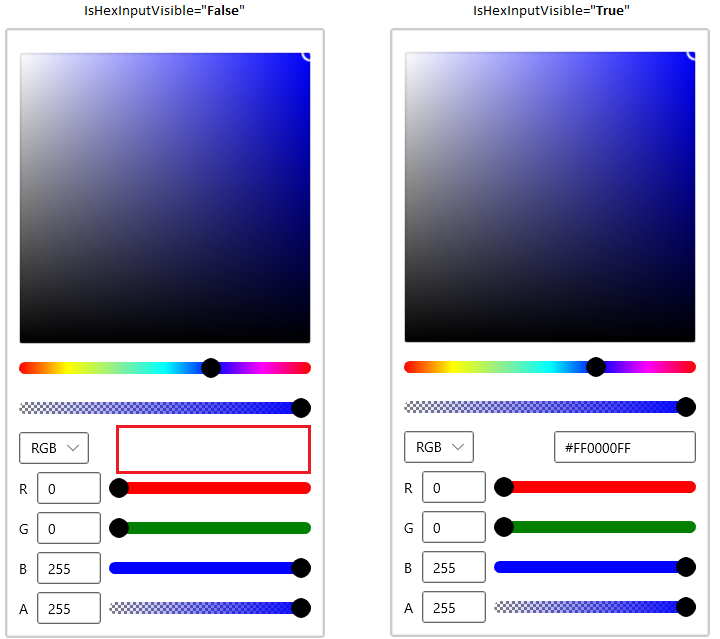
NOTE
Download demo application from GitHub
Select linear gradient brush
Linear Gradient color brush can be selected by the multiple colors and their location along the gradient axis using the GradientStop objects and StartPoint and EndPoint properties. Based on the StartPoint and EndPoint, the selected color brush will be combined in linear manner.
<editors:SfColorPicker x:Name="colorPicker">
<editors:SfColorPicker.SelectedBrush>
<LinearGradientBrush StartPoint="0,0" EndPoint="1,1">
<GradientStop Color="Yellow" Offset="0.0" />
<GradientStop Color="Red" Offset="0.25" />
<GradientStop Color="Blue" Offset="0.75" />
<GradientStop Color="LimeGreen" Offset="1.0" />
</LinearGradientBrush>
</editors:SfColorPicker.SelectedBrush>
</editors:SfColorPicker>//Creating the linear gradient brush
LinearGradientBrush linearGradient = new LinearGradientBrush();
linearGradient.StartPoint = new Point(0, 0);
linearGradient.EndPoint = new Point(1, 1);
linearGradient.GradientStops.Add(
new GradientStop() { Color = Colors.Yellow, Offset = 0.0 });
linearGradient.GradientStops.Add(
new GradientStop() { Color = Colors.Red, Offset = 0.25 });
linearGradient.GradientStops.Add(
new GradientStop() { Color = Colors.Blue, Offset = 0.75 });
linearGradient.GradientStops.Add(
new GradientStop() { Color = Colors.LimeGreen, Offset = 1.0 });
//Assigning a linear gradient brush to Color Picker
colorPicker.SelectedBrush = linearGradient;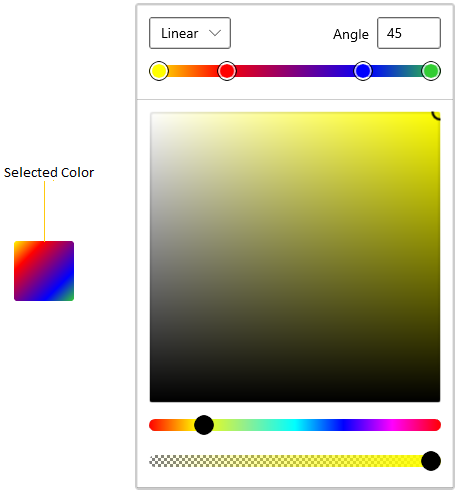
NOTE
Download demo application from GitHub
Select linear gradient brush interactively
You can directly select a required linear gradient color brush at runtime by setting the BrushTypeOptions property value as LinearGradientBrush. The default value of BrushTypeOptions property is All.
<editors:SfColorPicker BrushTypeOptions="LinearGradientBrush"
Name="colorPicker">colorPicker.BrushTypeOptions = BrushTypeOptions.LinearGradientBrush;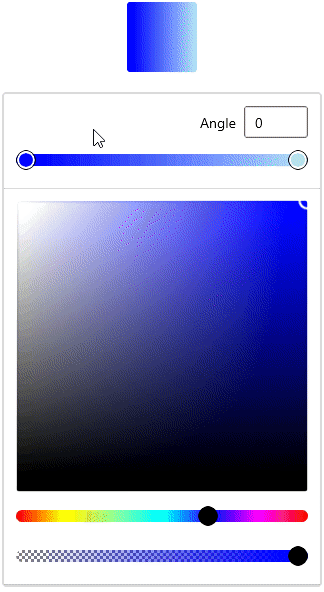
NOTE
Download demo application from GitHub
Select radial gradient brush
Radial Gradient color brush is similar to Linear Gradient color brush, except for the axis defined by the circle. Based on the GradientOrigin, Center and radius point values, the selected gradient color brush are combined in a circle manner.
<editors:SfColorPicker x:Name="colorPicker">
<editors:SfColorPicker.SelectedBrush>
<RadialGradientBrush GradientOrigin="0.5,0.5"
Center="0.5,0.5"
RadiusX="0.5" RadiusY="0.5">
<GradientStop Color="Yellow" Offset="0" />
<GradientStop Color="Red" Offset="0.25" />
<GradientStop Color="Blue" Offset="0.75" />
<GradientStop Color="LimeGreen" Offset="1" />
</RadialGradientBrush>
</editors:SfColorPicker.SelectedBrush>
</editors:SfColorPicker>//Creating a radial gradient brush
RadialGradientBrush radialGradient = new RadialGradientBrush();
radialGradient.GradientOrigin = new Point(0.5, 0.5);
radialGradient.Center = new Point(0.5, 0.5);
radialGradient.RadiusX = 0.5;
radialGradient.RadiusY = 0.5;
radialGradient.GradientStops.Add(
new GradientStop() {Color=Colors.Yellow, Offset= 0.0 });
radialGradient.GradientStops.Add(
new GradientStop() {Color=Colors.Red, Offset = 0.25 });
radialGradient.GradientStops.Add(
new GradientStop() {Color=Colors.Blue, Offset = 0.75 });
radialGradient.GradientStops.Add(
new GradientStop() {Color=Colors.LimeGreen, Offset = 1.0 });
//Assigning a radial gradient brush to Color Picker
colorPicker.SelectedBrush = radialGradient;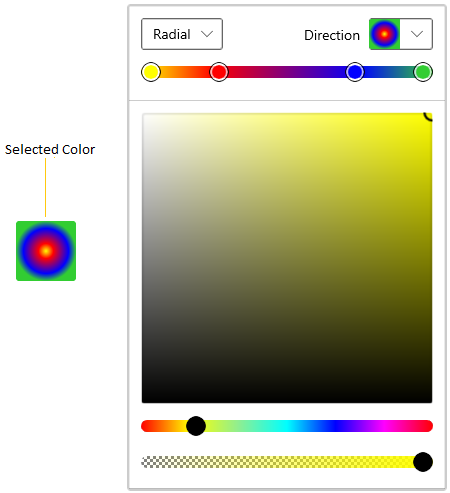
NOTE
Download demo application from GitHub
Select radial gradient brush interactively
You can directly select a required radial gradient color brush at runtime by setting the BrushTypeOptions property value as RadialGradientBrush.
<editors:SfColorPicker BrushTypeOptions="RadialGradientBrush"
Name="colorPicker">colorPicker.BrushTypeOptions = BrushTypeOptions.RadialGradientBrush;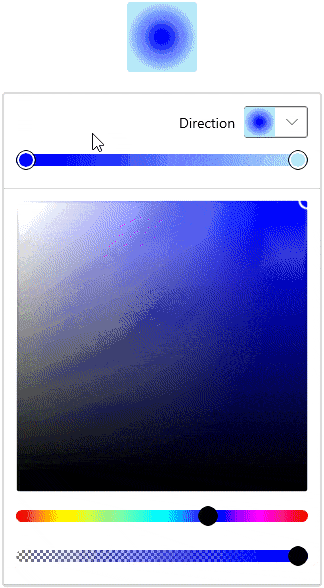
NOTE
Download demo application from GitHub
Switch between solid, linear and radial gradient brush mode
You can allow the user to choose either Solid, Linear or Radial gradient brush or any combination of brush mode by using the BrushTypeOptions property.
<editors:SfColorPicker BrushTypeOptions="SolidColorBrush,RadialGradientBrush"
Name="colorPicker">colorPicker.BrushTypeOptions = BrushTypeOptions.SolidColorBrush | BrushTypeOptions.RadialGradientBrush;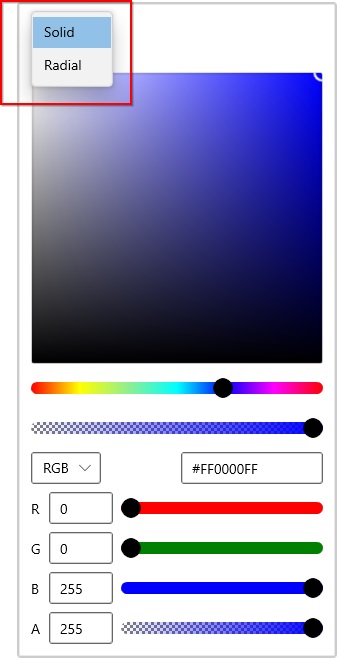
NOTE
Download demo application from GitHub
Switch between solid, linear and radial gradient brush mode interactively
You can change the color selection mode directly at runtime by clicking on the corresponding Solid, Linear or Radial gradient brush mode drop down options which is placed in the top of the Color Picker control.
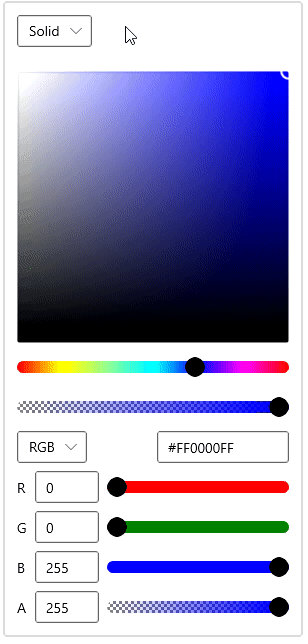
NOTE
Download demo application from GitHub
Selected brush changed notification
You will be notified when selected brush changed in Color Picker by using SelectedBrushChanged events. You can get the old and newly selected brush by using the OldBrush and NewBrush properties.
<editors:SfColorPicker SelectedBrushChanged="ColorPicker_SelectedBrushChanged"
Name="colorPicker">colorPicker.SelectedBrushChanged += ColorPicker_SelectedBrushChanged;You can handle the event as follows,
private void ColorPicker_SelectedBrushChanged(object sender, SelectedBrushChangedEventArgs args) {
var old_selectedBrush = args.OldBrush;
var new_selectedBrush = args.NewBrush;
}